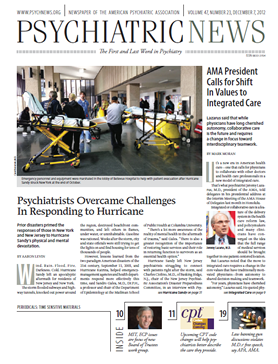The relationship between genetics and criminal behavior is controversial, but meta-analyses of family and adoption studies suggest that about 50 percent of the variance in criminal behavior is attributable to genes, said Steven Hoge, M.D., at the American Academy of Psychiatry and the Law’s annual meeting in Montreal in October.
A number of genes are associated with increased rates of criminality, noted Hoge, a forensic psychiatrist in private practice in New York City and director of the Columbia-Cornell Forensic Psychiatry Fellowship Program.
For instance, the catechol-O-methyltransferase (COMT) gene produces an enzyme involved in the degradation of epinephrine, norepinephrine, and dopamine. The low-activity allele (met/met) is associated with a 40 percent higher rate of criminality in individuals with attention-deficit/hyperactivity disorder and schizophrenia.
People with the 10-repeat allele of the DAT1 polymorphism of the dopamine transporter gene have a higher risk of delinquency than those with the 9-repeat allele.
The dopamine receptor gene DRD2 has two alleles. The A1/A1 version is associated with higher levels of victimization, alcoholism, pathological gambling, and possibly violence, while the A1/A2 variant is associated with a higher risk for delinquency.
Finally, the long-running Dunedin (New Zealand) Study found an association between the combination of low monoamine oxidase inhibitor-A and severe maltreatment with later criminal activity. About 12 percent of the study sample had that combination, Hoge explained, but they were associated with 44 percent of the criminal convictions in the sample.
Any causal mechanism linking genetic predisposition, environmental effects, and violent or antisocial behavior has yet to be described, said panelist David Wasserman, J.D. He noted that Avshalom Caspi, Ph.D., had suggested that it might be better to describe people with low MAO-A not as having antisocial impulses than as lacking internal resistance to controlling those impulses.
U.S. courts in the 1990s either rejected genetic testing as “uncertain science” or raised the prospect of genetic explanations of criminal behavior as being either exculpatory or damaging to a defendant’s case.
From 2004 to 2009, in about 200 criminal cases in the United States, attorneys tried to introduce genetic information about a defendant to explain behavior, said Hoge.
In fact, genetic arguments might be a double-edged sword, suggested Paul Appelbaum, M.D., the Dollard Professor of Psychiatry, Medicine, and Law and director of the Division of Law, Ethics, and Psychiatry at Columbia University, chair of the APA Committee on Judicial Action, and a past APA president.
“The idea of a remorseless, genetically programmed killer was hardly reassuring regarding mitigation of a death sentence,” said Appelbaum, paraphrasing a judge in the Landrigan case in Arizona in 1993.
Appelbaum and several colleagues tested whether genetic explanations might plausibly impel juries either to assign reduced responsibility to a defendant or lead to increased punishment.
They analyzed responses from 191 subjects using a vignette that ascribed different explanations for a hypothetical murder—impulsivity, prior abuse as a child, genetics, or genetics plus abuse.
They found no effects of abuse or genetics on how the respondents categorized the crime: as first- or second-degree murder or first- or second-degree manslaughter. (Most thought it should be classified as some form of manslaughter.)
After being told the defendant was convicted, the participants were then asked to choose an appropriate sentence. Here, there was a difference. Ascribing the crime to abuse or genetics plus abuse led to longer sentences (most commonly 20–25 years) compared with impulsivity or genetics alone (12–17 years).
Fear may have affected participants’ judgment.
“People who chose either genetic explanation were more fearful of the defendant being returned to the streets,” he said. Other research shows that greater fear is associated with longer sentences. “So it may not be better for defense attorneys to argue for a genetic explanation.”
Of course, the study did not have the same dimensions of extended testimony of a real trial, said Appelbaum. “However, with all the speculation about genetics and neuroscience in the law-review literature, it may be that these factors have no effects on how juries think,” he stated. “Beliefs in genetic determinism may be less widespread than people have thought.”
A different study of state trial judges published in Science in August found that presenting biological causes of a defendant’s psychopathy reduced sentences, but only by one year, a “fairly minimal difference,” in Appelbaum’s view.
However, such approaches could still have some effect on sentencing, reintegration, and fear of people with mental illness. Hence, the belief that biological explanations of behavior might reduce stigma associated with having a mental illness is not borne out, he said. It may just be too soon to draw firm conclusions, Appelbaum noted.
“We’re in the early stages of understanding these processes,” he said. “But that has not kept defense lawyers from using genetic arguments for mitigation in criminal cases.”
Judges, lawyers, and the public will ultimately shape public policy on how genetic information is used in forensic settings, but they’ll need some help from geneticists and forensic psychiatrists, said Hoge.


